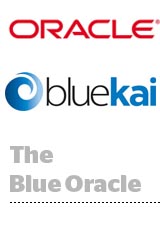 Oracle will acquire data services and technology company BlueKai for an estimated $350 to $400 million, bringing together one of the largest enterprise software companies with a market leading data management platform (DMP).
Oracle will acquire data services and technology company BlueKai for an estimated $350 to $400 million, bringing together one of the largest enterprise software companies with a market leading data management platform (DMP).
If the acquisition goes through, it would help solidify the Oracle’s previously uncertain position in the digital advertising space. It also represents another challenging shift for seven-year-old BlueKai, which originated as a buyer and seller of consumer data and pivoted to become a seller of data analytics and management technologies.
Business Insider reported a rumor of the deal over the weekend, reporting its value at $400 million. According to an AdExchanger source, a term sheet was signed roughly a month ago at $350 million — but the transaction price could’ve gone up since then. Press release.
The BlueKai acquisition is the latest in a string of big-time Oracle buys intended to extend its offerings in marketing and advertising tech. In May 2012, Oracle bought social marketing solutions provider Vitrue for an estimated $300 million. Its purchase of marketing automation firm Eloqua for around $810 million in December 2012 helped the company establish a “customer experience” cloud in the B2B space. And its December 2013 purchase of email and cross-channel marketing solutions provider Responsys for $1.5 billion gave it a B2C solution, better positioning the company to compete with competing marketing stacks from Adobe and Salesforce.com. With the BlueKai buy, its collective marketing tech acquisitions will total more than $3 billion.
BlueKai gives Oracle some heavy-duty marketing and advertising assets including a data exchange and data technologies.
“I can say that the crown jewel is not just the DMP but the Mobile DMP,” said Ray Wang, chairman and principal analyst at Constellation Research. “[Oracle] gains a great platform.” The Mobile DMP in particular, Wang said, fills a gaping hole in Oracle’s portfolio.
But analysts and industry experts have in the past questioned how effectively Oracle can execute building a marketing and advertising stack that marketers can use. On paper, the BlueKai acquisition might look good, but it remains to be seen whether Oracle effectively integrates the inherited technologies, though Wang doesn’t foresee much of an issue. “Oracle has done a good job in general integrating and rewriting acquisitions onto one platform,” he said.
Even overlooking the technological issues that might arise, BlueKai’s acquisition provides some tremendous challenges in that it potentially conflicts with one of its core messages: that the company’s data exchange business is separate from its various activation platforms, like its DMP. The data exchange business has been one of BlueKai’s chief differentiators and was one of the biggest assets as the company began its expansion into data toolsets.
BlueKai’s neutrality – its promise not to prioritize one demand-side platform (DSP) or data set over another – is key in building and maintaining those relationships. In a 2012 interview with AdExchanger, company CEO Omar Tawakol positioned BlueKai as a platform to “centralize all the marketer’s data into one place and then drive segmentation across all of the execution platforms.”
Despite this messaging, sales teams from competing data solutions and ad tech providers often denigrate this agnosticism. The acquisition will only fuel these debates, and BlueKai will have to update its messaging to assuage the concerns of clients and partners – both current and potential. As Wang said: “Success will require more neutrality than exclusivity.”
Even without the acquisition, BlueKai continues to undergo a tremendous amount of change. From 2009 through 2012, it saw 9,245% revenue growth – a 2012 annual of $26.8 million. Within the ad tech space specifically, BlueKai has worked to grow its publisher clients. And marketer clients, Tawakol noted at Industry Preview 2014, have been plugging more communications channels into BlueKai’s DMP: from an average of two in January 2013 to six by September.
AdExchanger Daily
Get our editors’ roundup delivered to your inbox every weekday.
Daily Roundup
Still, BlueKai’s acquisition shouldn’t surprise anyone familiar with the ad tech industry. AdExchanger Director of Research Joanna O’Connell predicted back when she was a Forrester Analyst that BlueKai would be hard-pressed “to remain a standalone platform as continued consolidation continues to pull such platforms into larger marketing technology stacks.”
As O’Connell wrote in a Forrester Wave report, BlueKai’s experience in buying and selling third-party consumer data “set it up nicely for migration toward the DMP space, which began roughly [in 2011] with clients such as Hewlett Packard as early adopters.” Specifically, BlueKai developed solid data management technologies in an environment where it already had excellent relationships with data brokers and ad tech players. In contrast Demdex, acquired by Adobe in 2011 and which became the DMP AudienceManager, had the technology but not the key relationships.
By all public accounts, BlueKai is on an upward trajectory. The challenge for both BlueKai and Oracle will be to ensure the acquisition, amid the usual issues of technological, employee, and client integration, doesn’t halt this trend.
Another point of interest is where this leaves competitors like IBM and Salesforce.com, both rumored BlueKai suitors. Unlike Adobe and now Oracle, Salesforce.com doesn’t have a DMP. And IBM also doesn’t have the same recognition in marketing tech as its peers, despite launching its Smarter Commerce marketing consulting practice in 2011.
Updated: At last month’s Industry Preview 2014, key executives from Oracle and BlueKai participated in on-stage presentations and discussions.
First, “A Look Ahead With Oracle” and a presentation by Kevin Akeroyd, GM, Oracle Marketing Cloud, Oracle.
Next, a panel discussion on “Data Management Platforms” from Industry Preview 2014.
Participants:
- Joanna O’Connell, Director of Research, AdExchanger – Moderator
- Scott Howe, CEO, Acxiom
- Omar Tawakol, CEO, BlueKai
- Bill Demas, CEO, Turn
- John Nardone, CEO, x+1
AdExchanger Director of Research Joanna O’Connell contributed.













